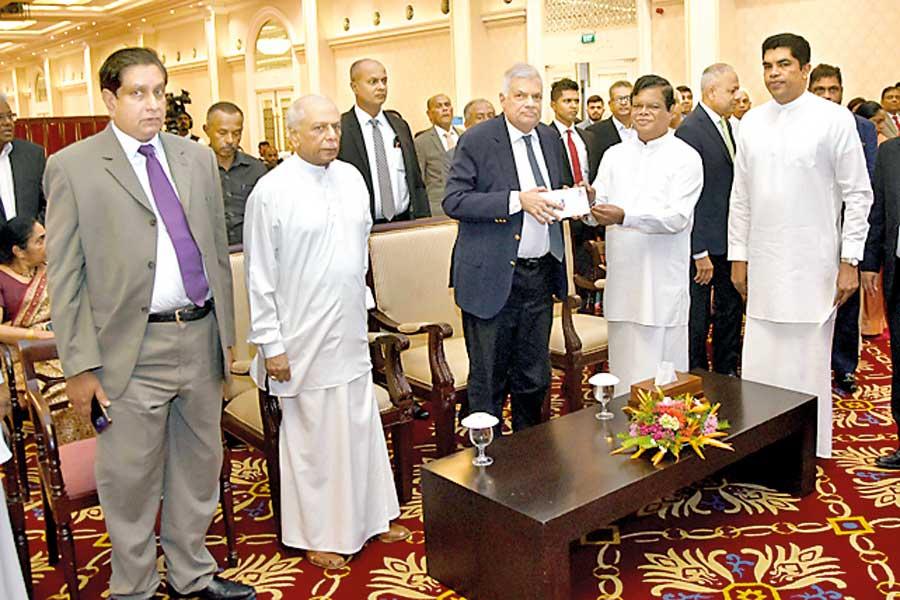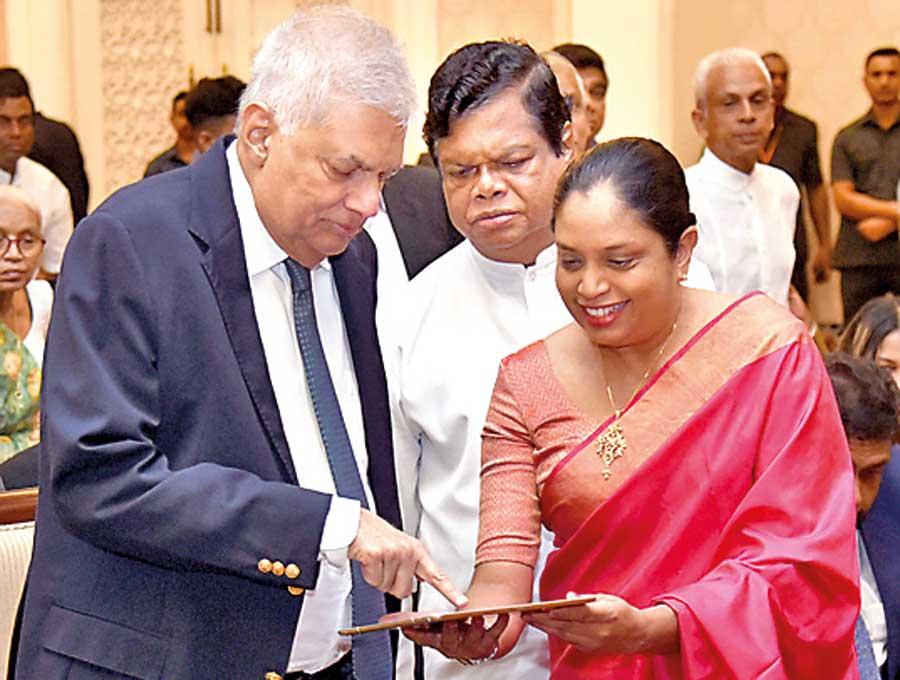15 Dec 2023 - {{hitsCtrl.values.hits}}
- To mark his 100 year birth anniversary a commemorative first day cover and stamp was issued by the Postmaster General of Sri Lanka at a special function organized at the Temple Trees recently
- One of the highlights of the event was the launch of the AI corner at the Colombo University library
- Speaking at the occasion President Wickremesinghe said that it is now important to adopt new technologies such as Artificial Intelligence (AI)

The statue of Prof. Stanley Wijesundera is seen moments after it was unveiled by President Ranil Wickremesinghe.
Pix by Kushan Pathiraja
Internationally renowned visionary educationist Prof. Stanley Wijesundera had been the livewire behind the setting up of the University of Colombo. His legacy has inspired many academics and scholars to take the mantle forward in terms of providing a quality education to undergraduates. Having started his career as a lecturer at the University of Ceylon, Prof. Wijesundera then ascended to the post of Professor of Biochemistry after many decades. He then served as the Dean and the Founding Vice Chancellor of the University of Ceylon; serving in the latter post for over 11 years. At the time of his assassination in March 1989, Prof. Wijesundera had already initiated the transformation of the university education system. Although his loss created an irreplaceable void, his family, associates and fellow academics have made great efforts to take his legacy forward.
academics and scholars to take the mantle forward in terms of providing a quality education to undergraduates. Having started his career as a lecturer at the University of Ceylon, Prof. Wijesundera then ascended to the post of Professor of Biochemistry after many decades. He then served as the Dean and the Founding Vice Chancellor of the University of Ceylon; serving in the latter post for over 11 years. At the time of his assassination in March 1989, Prof. Wijesundera had already initiated the transformation of the university education system. Although his loss created an irreplaceable void, his family, associates and fellow academics have made great efforts to take his legacy forward.

Minister of Mass Media Dr. Bandula Gunawardena presenting the first day stamp and cover issued in view of the 100 year birth anniversary of Prof. Stanley Wijesundera to President Ranil Wickremesinghe
A centenary later
To mark his 100 year birth anniversary a commemorative first day cover and stamp was issued by the Postmaster General of Sri Lanka S.Sathkumara at a special function organized at the Temple Trees recently. The event was presided by President Ranil Wickremesinghe, family and friends of Prof. Wijesundera and several other dignitaries. One of the highlights of the event was the launch of the AI corner at the Colombo University library; an initiative powered by IronOne technologies where students can now access all resources and reading materials required for their studies at the click of a button.
Addressing the gathering President Wickremesinghe reminisced his relationship with late Prof. Wijesundera’s family. “I associated with Prof. Stanley Wijesundera for a long time, especially as a family friend. This relationship strengthened when I joined the Colombo University in 1968, where Prof. Wijesundera was serving as a lecturer. I was at the law faculty while he worked in the science faculty. Thereafter in 1977 when J.R. Jayewardene established a new government Prof. Wijesundera worked closely with Minister Stanley Kalpage. In fact we worked together to formulate the new university act. Thereafter when we discussed about appointing a Vice Chancellor to the University Minister Kalpage suggested that Prof. Wijesundera was the most eligible candidate for the post of university’s vice chancellor. Minister of Higher Education Nissanka Wijeratne too agreed and thereafter Prof. Wijesundera was responsible for the university’s progress. He developed the science faculty and the computer centre was opened with the help of Prof. Samaranayake. Thereafter new faculties were introduced at the university,” said Wickremesinghe.
With the Rs. 8 billion allocation we will be establishing a new body called the Technology and Innovation Council as we need to reap commercial benefits from technology. A new Digital Transformation Agency too will be established and these bodies will help establish a digital economy. The AI corner at the Colombo university will be a stepping stone for the implementation of these technologies
-President Ranil Wickremesinghe
Speaking about the late Professor’s assassination, President Wickremesinghe said that not only Prof. Wijesundera, many other university lecturers who were erudite scholars at the time were assassinated. “It was an era where student leaders such as Daya Pathirana were being assassinated. This marked the beginning of these crimes. But it wasn’t the police. The police as usual used to fire tear gas at protesters like how they do now. But many factions were responsible for these crimes. Many monks including Kolonnawa Saddhatissa Thera were assassinated. When Daya Pathirana was assassinated the police wanted to question the students, but Prof. Wijesundera didn’t allow for it. He identified a risk in getting involved in the matter and he continued his work as usual but his assassination is an unbearable loss to the nation,” recalled Wickremesinghe.
President Wickremesinghe further said that it is now important to adopt new technologies such as Artificial Intelligence (AI). “People fear its limits, but we cannot avoid AI in this time and age. Therefore in order to work better with AI technology we have allocated Rs. 1.5 billion from the budget. I’m willing to speak to experts in this field. We have discussed and allocated Rs. 8 billion for the development of science. As a government we need to observe the climate crisis and energy transition and two large investors have already submitted proposals to the cabinet. But some still feel that we should opt for old school ways of generating energy. But with solar and wind energy we can generate more power. Therefore we need new knowledge on science and technology and transform our economy to a digital economy. With the Rs. 8 billion allocation we will be establishing a new body called the Technology and Innovation Council as we need to reap commercial benefits from technology. A new Digital Transformation Agency too will be established and these bodies will help establish a digital economy. The AI corner at the Colombo university will be a stepping stone for the implementation of these technologies and I’m pleased to announce that the funds allocated for the AI fund can be utilised to further these efforts,” he said in conclusion.
Higher Education and its role in sustainable development
In his keynote speech Prof. Mohan Munasinghe, Chairman of the Munasinghe Institute for Development shared some insightful thoughts on how people including the civil society could work together with governments to strengthen good governance. “There are huge inequalities that exist between the rich and the poor. On the other hand there’s unfair consumption of food and resources. The Universal Declaration of Human Rights came about in 1947 and the Sustainable Development Goals (SDGs) were introduced in 2017. But where has the progress been 75 years later,” he questioned.
We need education to think in multidisciplinary terms. Problems with sustainable development are very complex and these are being taught rigorously at universities. But we need to think broadly about the outputs of these universities as well. We also need to educate people to transcend stakeholder problems
- Prof. Mohan Munasinghe, Chairman of the Munasinghe Institute for Development
“There are many unmet goals and broken promises. In fact we must work together to achieve these 17 goals and it should be an integrated approach. In 1992 I presented a framework at the Rio Earth Summit; it was based on Sustainomics and the Balanced Inclusive Green Growth as means of facilitating the implementation of the SDGs,” he added.
In his speech he underscored several key concepts that address economic prosperity, social progress and environment. “We need to empower people to turn off a switch for instance and make at least a tiny contribution to save energy consumption and the environment. Education too is a must as we need fresh ideas. The excessive consumption by the rich has caused all environmental problems including climate change. Hence the more environmental problems we have, the less resources we have. In fact all countries are fighting for resources such as gas, oil, water and so on. We need education to think in multidisciplinary terms. Problems with sustainable development are very complex and these are being taught rigorously at universities. But we need to think broadly about the outputs of these universities as well. We also need to educate people to transcend stakeholder problems. Governments alone cannot solve problems and we need civil society organizations to work hand in hand,” said Prof. Munasinghe
He then suggested a model where rich countries could decarbonise with modern technology including digital technology. Studies have shown that big countries that emit greenhouse gases can be liable to pay huge amounts of money as climate reparations. “In this backdrop countries such as Sri Lanka could follow the Green Growth Path without blindly following the path followed by rich countries. Here we balance economy, government and good education drives innovation. The social element will look at pro-poor, inclusive policies making it a more holistic approach and a collective responsibility for all citizens,” he added.

President Wickremesinghe virtually launching the AI corner of the Colombo University library powered by IronOne Technologies. Seen on the right is leading IT entrepreneur Lakmini Wijesundera, daughter of Prof. Stanley Wijesundera
07 Jan 2025 7 hours ago
07 Jan 2025 7 hours ago
07 Jan 2025 8 hours ago
07 Jan 2025 07 Jan 2025
07 Jan 2025 07 Jan 2025